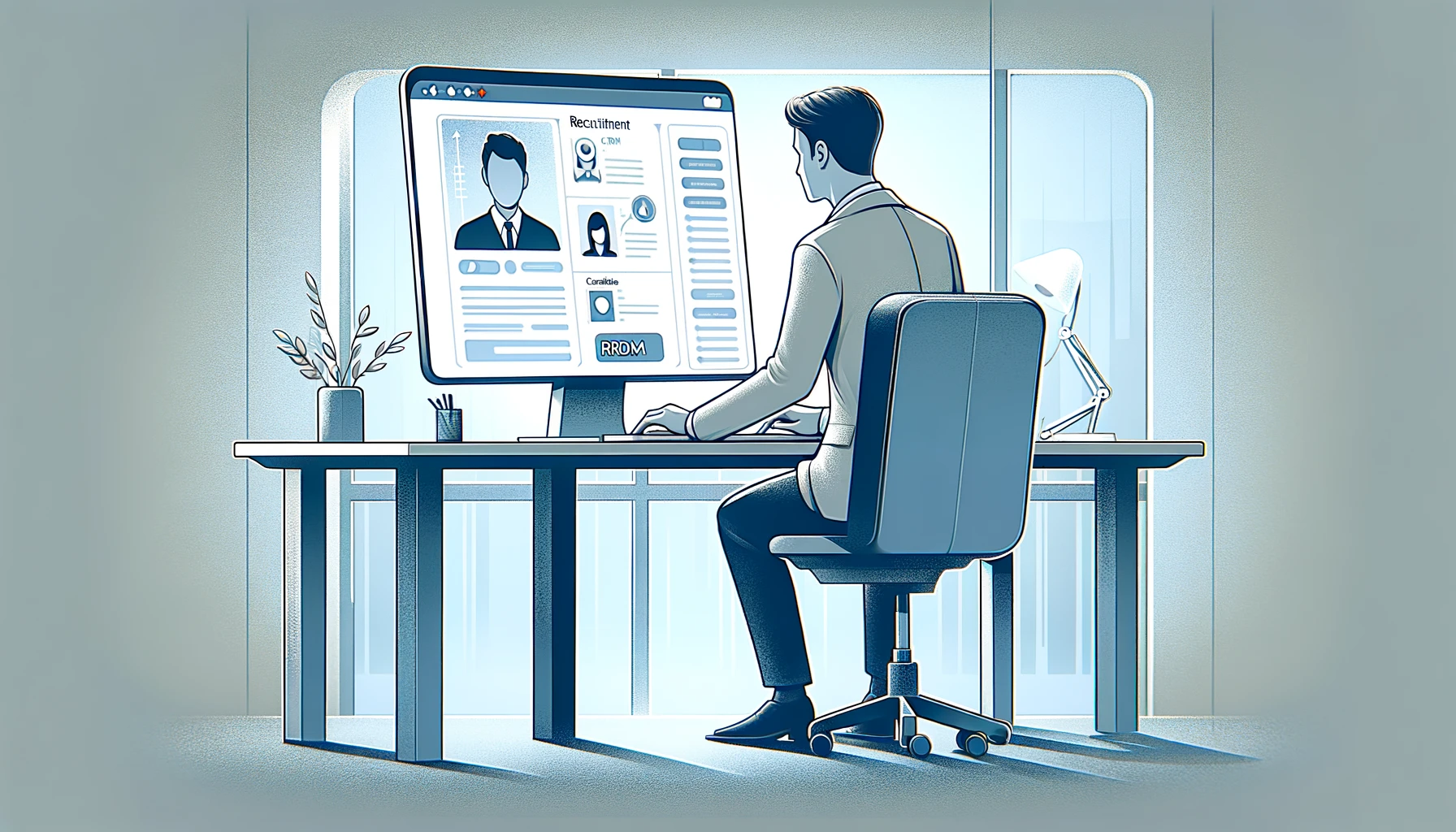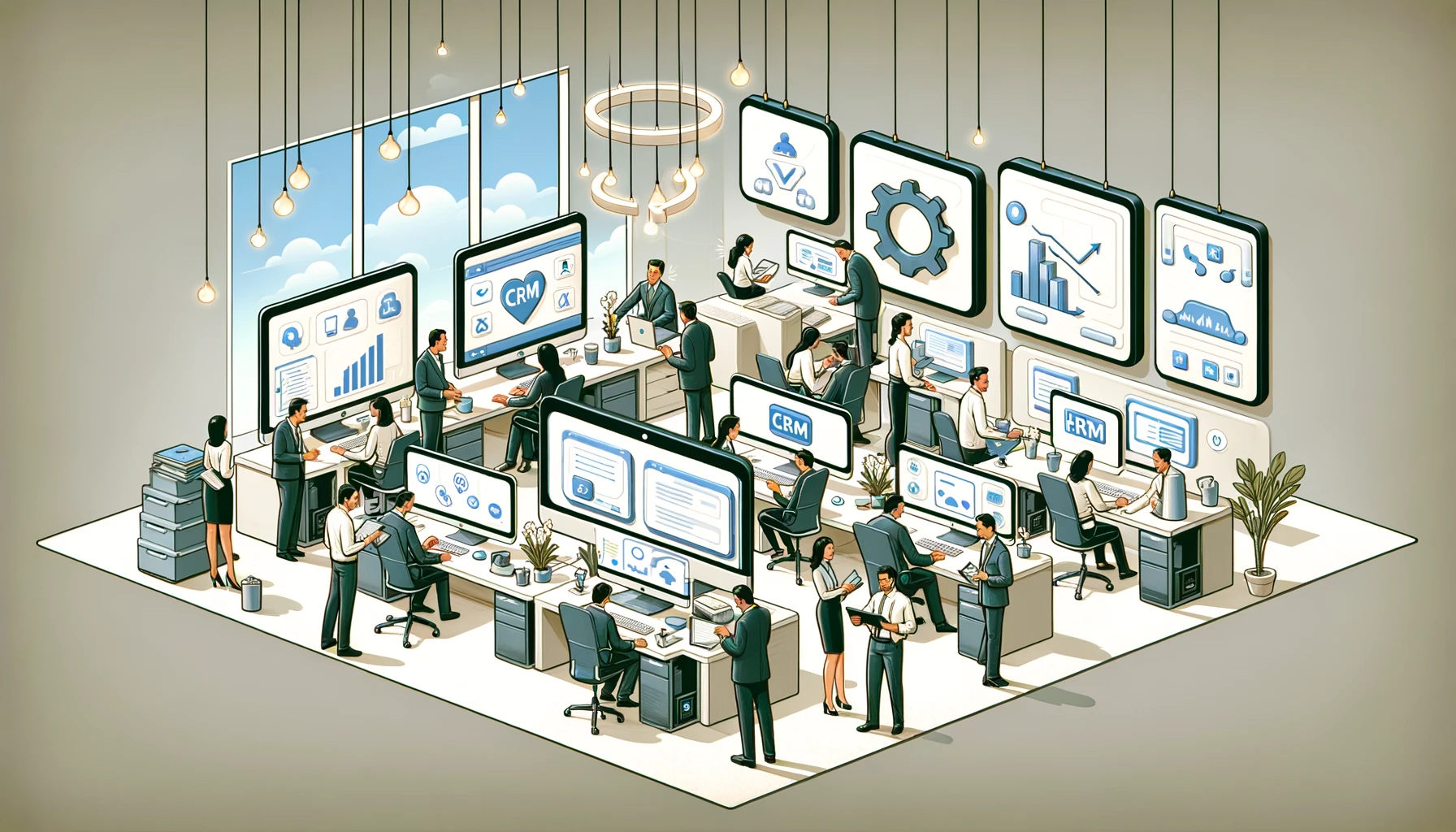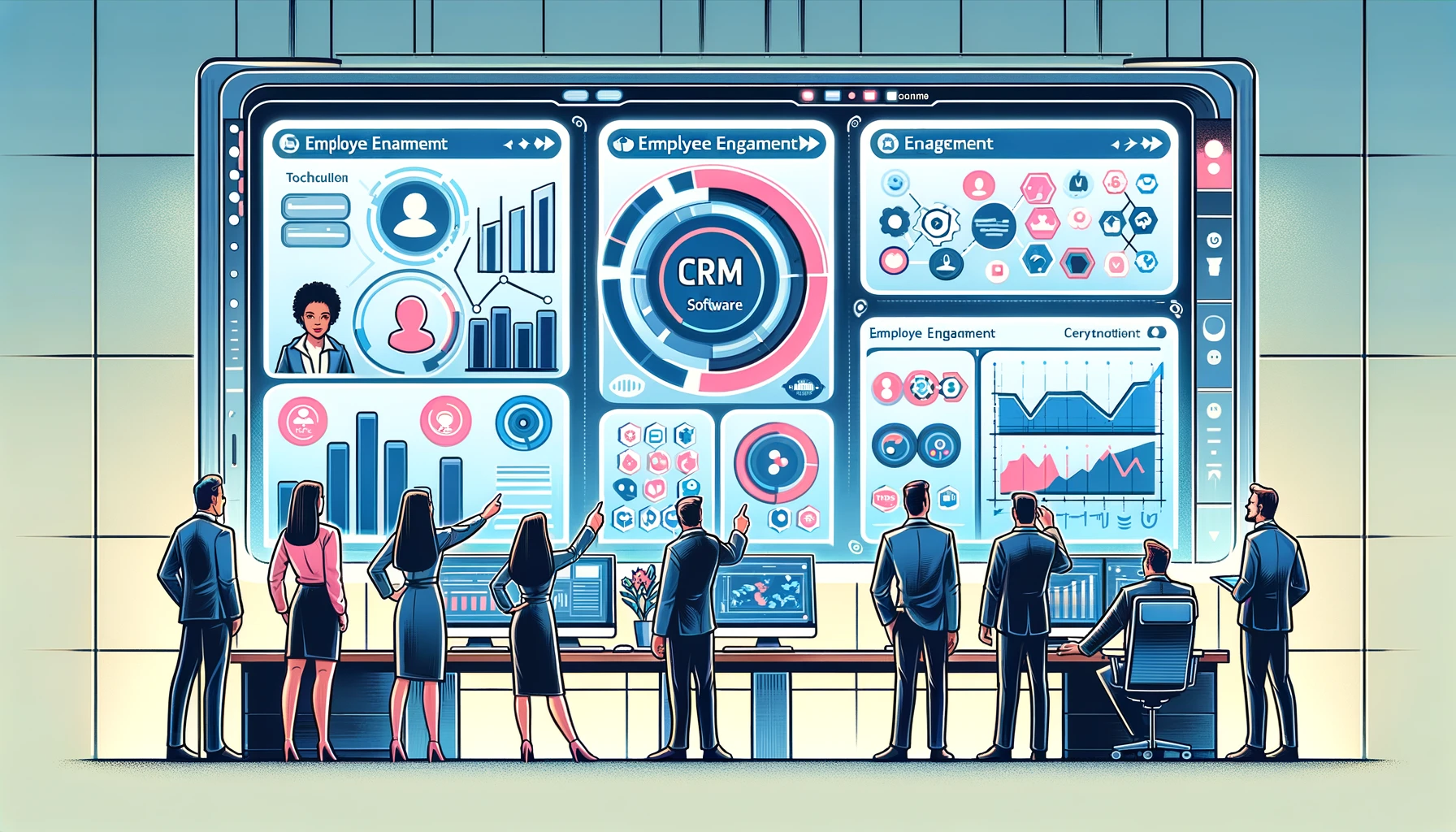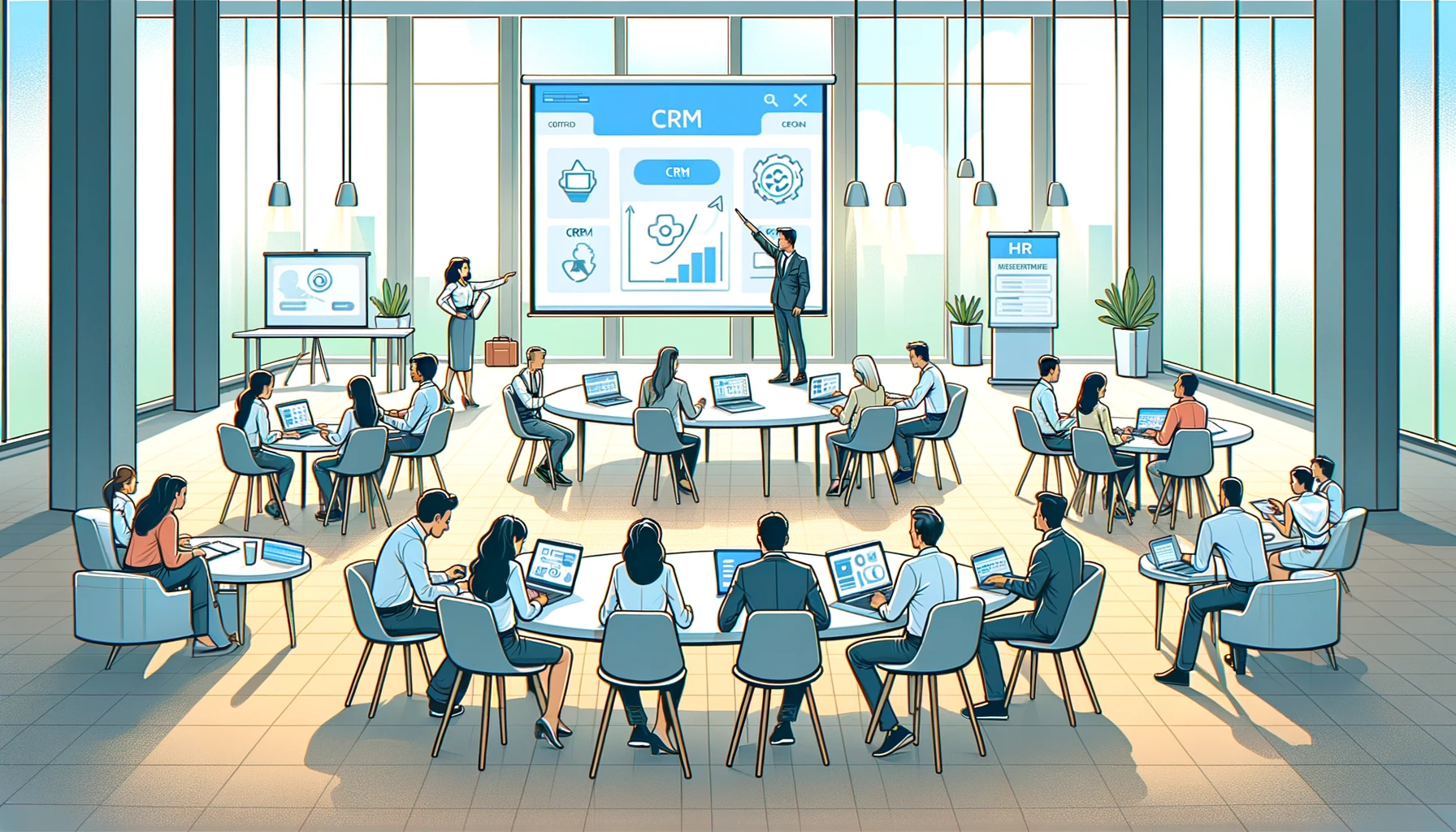Human Resource Management: Maximizing CRM Integration

Master cutting-edge human resource management techniques to elevate your workforce and drive business success.
Understanding the Role of Human Resource Management in CRM Integration
In the business world, human resource management and CRM software are two sides of the same coin. Both aim to enhance productivity, streamline processes, and foster stronger relationships. But how does human resource management fit into the equation of CRM integration?
As we look into this, it’s crucial to remember that human resource management is not just about hiring and firing. It’s about managing the most vital resource a company has - its people. This involves everything from recruitment and training to performance evaluation and employee retention.
CRM software, on the other hand, is designed to manage relationships with customers, but it’s not limited to that. When integrated with human resource management, it can become a powerful tool for managing internal relationships within a company as well.
For instance, a CRM system can be used to track and analyze employee performance, allowing HR managers to identify strengths and weaknesses, and provide timely feedback. This, in turn, can help improve job satisfaction and employee retention rates.

Moreover, CRM software can also aid in recruitment. By keeping track of all interactions with potential candidates, HR managers can ensure a smooth hiring process and enhance the candidate experience.
Here are a few ways a CRM system can enhance human resource management:
-
Streamlining recruitment: By keeping track of all interactions with potential candidates, a CRM system can ensure a smooth hiring process and enhance the candidate experience.
-
Enhancing training programs: CRM software can be used to create and manage training programs, helping to ensure that all employees have the necessary skills to perform their jobs effectively.
-
Improving employee engagement: By providing employees with a platform to communicate and collaborate, a CRM system can help foster a more positive and productive work environment.
-
Increasing efficiency: By automating routine tasks, CRM software can free up time for HR managers to focus on more strategic initiatives.
The integration of human resource management with CRM software can bring about significant improvements in efficiency, employee satisfaction, and overall business performance. As such, it’s an investment that every forward-thinking company should consider.

How CRM Software Enhances Human Resource Management Efficiency
Enhancing efficiency in human resource management is no longer an option but a necessity in the current competitive business environment. The integration of CRM software into HR functions can transform the way a company manages its employees, improving both productivity and employee satisfaction.
A CRM system can automate numerous HR tasks, saving countless hours of manual work. From tracking employee performance to managing recruitment processes, CRM software can do it all. This automation not only reduces the likelihood of human error but also allows HR managers to focus on strategic tasks that can drive business growth.

For instance, consider the recruitment process. With CRM software, HR managers can easily keep track of all interactions with potential candidates, ensuring a smooth hiring process. The software can also analyze data from these interactions, helping HR managers make informed recruitment decisions.
Similarly, CRM software can be used to track and analyze employee performance. By identifying patterns and trends in this data, HR managers can provide timely feedback and recognition, leading to improved job satisfaction and employee retention.
Here are some key ways CRM software can boost HR efficiency:
- Automating routine tasks: This reduces the likelihood of human error and frees up time for HR managers to focus on strategic tasks.
- Streamlining recruitment: The software can track all interactions with potential candidates, ensuring a smooth hiring process.
- Enhancing performance management: CRM software can analyze employee performance data, helping HR managers provide timely feedback.

In essence, CRM software can revolutionize the way a company manages its human resources, enhancing efficiency and productivity. It’s a tool that can unlock the full potential of your HR department, driving business growth and success.
Here is a brief comparison of HR efficiency before and after CRM software implementation:
| HR Metric | Before CRM | After CRM | Improvement |
|---|---|---|---|
| Recruitment Process Time (days) | 30 |
15 |
-50% |
| Employee Turnover Rate (%) | 20 |
10 |
-50% |
| Employee Satisfaction Score (out of 10) | 6 |
8 |
+33.3% |
| HR Process Efficiency (%) | 65 |
85 |
+30.8% |
As seen on the table, integrating CRM software into human resource management can significantly enhance HR efficiency, leading to improved productivity and business performance. It’s an investment that can yield substantial returns in the long run.
Transforming Business Operations: The Impact of CRM on Human Resource Management
The integration of CRM software into human resource management has revolutionized the way businesses operate. It has transformed the traditional HR processes, making them more efficient and effective.
CRM software provides a centralized platform that allows HR managers to manage all employee-related data in one place. This includes everything from personal information to performance metrics. This centralization of data not only streamlines HR processes but also eliminates the risk of data duplication or loss.

Moreover, the analytics capabilities of CRM software can provide HR managers with valuable insights into employee behavior and performance. For instance, it can identify patterns in absenteeism, highlight top performers, and reveal training needs. These insights can help HR managers make data-driven decisions, leading to improved productivity and employee satisfaction.
Here are some key ways CRM software can transform HR operations:
- Centralizing employee data: All employee-related data can be managed in one place, streamlining HR processes and eliminating data duplication.
- Providing valuable insights: The analytics capabilities of CRM software can reveal patterns in employee behavior and performance, helping HR managers make data-driven decisions.
- Automating HR processes: CRM software can automate various HR tasks, saving time and reducing the likelihood of human error.

The integration of CRM software into HR operations can also enhance employee engagement. By providing a platform for communication and collaboration, it can foster a more positive work environment. This can lead to improved job satisfaction, increased employee retention, and ultimately, better business performance.
To illustrate the transformational impact of CRM on HR operations, consider the following comparison:
| HR Metric | Before CRM | After CRM | Improvement |
|---|---|---|---|
| Data Management Efficiency (%) | 60 |
85 |
+41.7% |
| Insight-Driven Decisions (%) | 50 |
78 |
+56% |
| Employee Engagement Score (out of 10) | 6 |
8.2 |
+36.7% |
The transformational impact of CRM software on human resource management is clear. By streamlining HR processes, providing valuable insights, and enhancing employee engagement, it can significantly improve business operations. Therefore, the integration of CRM software into HR operations is not just a trend, but a necessity for businesses in the modern competitive environment.
Practical Examples of CRM Software Boosting Human Resource Management
In the realm of human resource management, applying CRM software can work wonders by streamlining processes and boosting efficiency. Let’s explore some practical examples to illustrate this.
One of the most significant applications of CRM software in human resource management is in the recruitment process. By tracking all interactions with potential candidates, the software can create a comprehensive profile of each candidate. This profile can be used to assess the suitability of the candidate for the job, thereby enhancing the recruitment process. It saves HR managers the time they would otherwise spend manually sorting through piles of resumes and applications.

Another key area where CRM software can boost HR management is in performance evaluation. The software can track and analyze various performance metrics, providing HR managers with a clear view of each employee’s performance. This data-driven approach to performance evaluation eliminates bias and ensures that feedback and promotions are based on merit rather than subjective assessments.
Here’s how CRM software can boost HR management:
- Streamlining recruitment: The software can track all interactions with potential candidates, creating a comprehensive profile for each candidate. This enhances the recruitment process and saves HR managers time.
- Enhancing performance evaluation: CRM software can track and analyze performance metrics, providing a data-driven approach to performance evaluation. This ensures that feedback and promotions are based on merit.

Furthermore, CRM software can enhance employee engagement by providing a platform for communication and collaboration. This can foster a more positive work environment, leading to improved job satisfaction and employee retention.
In essence, CRM software can significantly boost human resource management by streamlining processes and enhancing efficiency. It’s an investment that can yield substantial returns, improving both productivity and employee satisfaction.
| HR Metric | Before CRM | After CRM | Improvement |
|---|---|---|---|
| Recruitment Efficiency (%) | 65 |
85 |
+30.8% |
| Performance Evaluation Accuracy (%) | 70 |
92 |
+31.4% |
| Employee Engagement Score (out of 10) | 6 |
8.5 |
+41.7% |
Getting Started: Implementing CRM Software for Optimal Human Resource Management
The journey to implementing CRM software for optimal human resource management can seem daunting, but it doesn’t have to be. With careful planning and execution, you can leverage CRM to transform your HR processes and boost your business performance.
The first step is to clearly define your objectives. What do you hope to achieve by integrating CRM software into your HR processes? Is it to streamline recruitment, enhance performance evaluation, or improve employee engagement? Having clear objectives will guide your implementation process and help you measure success.
Next, choose a CRM system that aligns with your HR needs. Look for features like recruitment tracking, performance analysis, and communication platforms. Also, consider factors such as ease of use, scalability, and integration with existing systems.
Once you’ve chosen a CRM system, it’s time to implement. This involves configuring the software to match your HR processes, migrating existing data, and training staff to use the new system. Be sure to involve your HR team in this process, as their buy-in is crucial for successful implementation.

After implementation, monitor the system regularly to ensure it’s meeting your objectives. Use metrics like recruitment efficiency, performance evaluation accuracy, and employee engagement score to measure success. If necessary, make adjustments to optimize the system for your HR needs.
Here’s a step-by-step guide to implementing CRM software for optimal human resource management:
- Define your objectives: What do you hope to achieve by integrating CRM into your HR processes?
- Choose a CRM system: Look for features that align with your HR needs and factors like ease of use and scalability.
- Implement the system: Configure the software, migrate existing data, and train staff.
- Monitor and optimize: Use metrics to measure success and make adjustments as necessary.

By following these steps, you can successfully implement CRM software for optimal human resource management and unlock the full potential of your HR department. It’s a transformative investment that can yield significant returns in the form of improved HR efficiency, productivity, and employee satisfaction.
| HR Metric | Before CRM | After CRM | Improvement |
|---|---|---|---|
| Recruitment Efficiency (%) | 65 |
88 |
+35.4% |
| Performance Evaluation Accuracy (%) | 70 |
95 |
+35.7% |
| Employee Engagement Score (out of 10) | 6 |
8.7 |
+45% |
FAQs on Human Resource Management
-
What Is Human Resource Management (HRM) and Why Is It Important? Human Resource Management (HRM) is the strategic approach to managing a company’s employees to foster business success. It’s crucial because it involves recruiting, training, and retaining talented employees, ensuring compliance with labor laws, and creating a positive work environment. HRM plays a pivotal role in maximizing the efficiency of the workforce, which directly contributes to the overall productivity and profitability of an organization.
-
How Does HRM Differ From Personnel Management? While both HRM and Personnel Management deal with managing employees, HRM takes a more strategic and comprehensive approach, focusing on aligning human resources with the strategic objectives of an organization. In contrast, Personnel Management is often more administrative, dealing with employee relations, compensation, and compliance with employment laws on a day-to-day basis.
-
What Are the Key Functions of Human Resource Management? The key functions of HRM include recruitment and staffing, learning and development, employee relations, compensation and benefits management, performance management, and ensuring compliance with employment laws. HRM also involves strategic initiatives like workforce planning, talent management, and diversity and inclusion efforts to support the organization’s goals.
-
Can HRM Strategies Impact Organizational Performance? Yes, effective HRM strategies can significantly impact organizational performance. By attracting, developing, and retaining the best talent, fostering a positive work culture, and aligning employee goals with organizational objectives, HRM can enhance productivity, innovation, and profitability. Moreover, strategic HRM practices can improve employee satisfaction and loyalty, which contributes to lower turnover rates and higher employee engagement levels.
-
What Are the Emerging Trends in Human Resource Management? Emerging trends in HRM include the increased use of technology and HR analytics for data-driven decision-making, a greater focus on employee experience and wellbeing, the rise of remote and flexible work arrangements, and the importance of diversity, equity, and inclusion (DEI) initiatives. These trends are reshaping how organizations manage their human resources to adapt to changing workforce dynamics and maintain a competitive edge.
Read more about low-code platform ozma.io
2024 Staffing & Scheduling: Key to Success





